MARS: Will it be our next HOME?
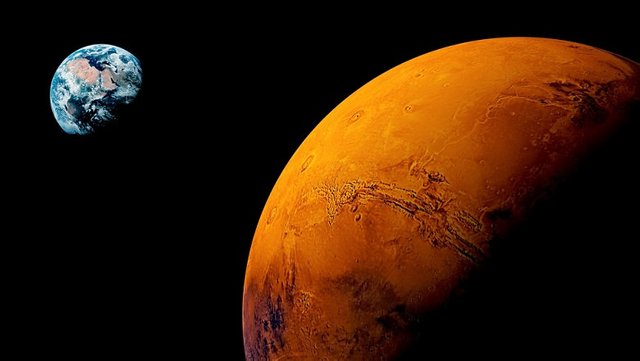
"Will MARS be Our Next Home?"
When man discovered fire, it became the stepping stone for the development of Human Intelligence. Now, we are on a further quest for knowledge and wisdom to better understand where and when did life all began. Our curiosity took us to different worlds to trace answers that could determine the evolution of life as we know it. Decades of continuous explorations and missions to search for any possibility that we might not be alone in a vast universe.
Is life only possible on Earth?
Human imagination and curiosity was not limited on Earth only as we have been yet exploring other planets millions of miles away in search for other life forms. And our neighboring planets like Mars has been our great interest ever since.
Mars and its Marvels
Mars is commonly referred as the "Red Planet" because of the prevalent iron oxide on its surface which gives its reddish appearance. It is the the fourth planet from the Sun and before the space explorations, Mars was considered the best candidate for harboring extraterrestrial life.
It is hypothesized that over a million years ago, Mars was much like of Earth. It was then suggested that Mars is capable of propagating life into a civilization. But as satellites and rovers began to conduct surveys of the planet, this theory quickly dissolved.
However, unexpected findings by Mars Global Surveyor after it entered the Mars' orbit are now changing perspectives as it discovers weak magnetic fields existing in its various regions. This is probably remnants of an earlier global field that has since disappeared. This information has an important implications for the structure of Mars' interior and for the past history of its atmosphere, hence for the possibility of ancient life.
Mars Today
Today, Mars is under extensive study as it have showed signs of liquid water flowing on its surface in the ancient past. There is a small fleet of orbiters and rovers at Mars right now , including the large NASA Curiosity rover that landed in 2012, to uncover the knowledge concerning its history as reference for the future.
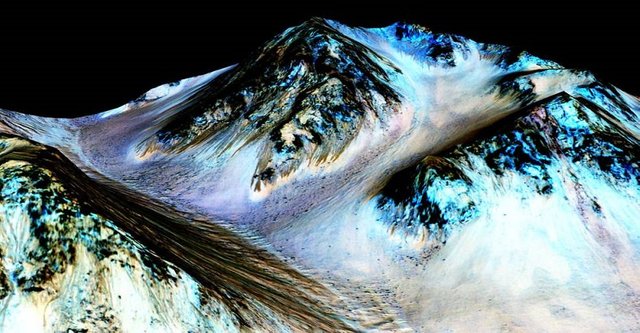
These dark, narrow, 100 meter-long streaks called recurring slope lineae flowing downhill on Mars are inferred to have been formed by contemporary flowing water. Recently, planetary scientists detected hydrated salts on these slopes at Hale crater, corroborating their original hypothesis that the streaks are indeed formed by liquid water. The blue color seen upslope of the dark streaks are thought not to be related to their formation, but instead are from the presence of the mineral pyroxene. The image is produced by draping an orthorectified (Infrared-Red-Blue/Green(IRB)) false color image (ESP_030570_1440) on a Digital Terrain Model (DTM) of the same site produced by High Resolution Imaging Science Experiment (University of Arizona). Vertical exaggeration is 1.5. The findings from NASA's Mars Reconnaissance Orbiter (MRO) provide the strongest evidence yet that liquid water flows intermittently on present-day Mars. John Grunsfeld, astronaut and associate administrator of NASA’s Science Mission Directorate in Washington said: “Our quest on Mars has been to ‘follow the water,’ in our search for life in the universe, and now we have convincing science that validates what we’ve long suspected”. “This is a significant development, as it appears to confirm that water -- albeit briny -- is flowing today on the surface of Mars.” Read more HERE. This discovery, if confirmed scientifically, will be the greatest breakthrough by NASA on its Mars missions.
Credits: NASA/JPL/University of Arizona
Will life persist on Mars?
Living on Mars will be a significant challenge for now, as its Atmospheric Conditions would not be capable of supporting the existence of life.
MARS COMPARED TO EARTH - Atmospheric Conditions
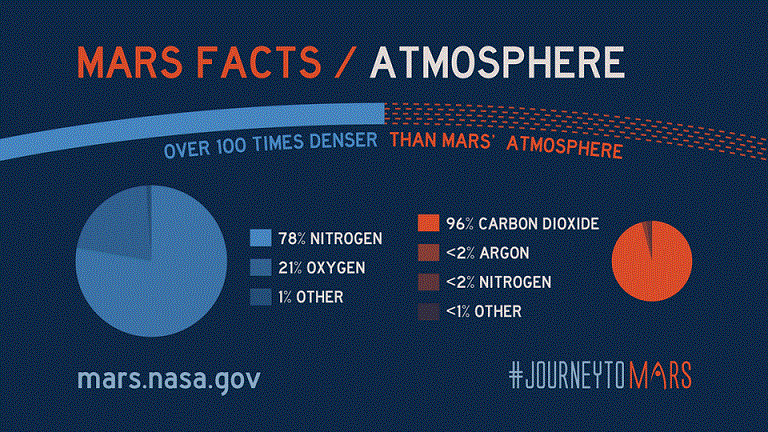
The atmosphere of Mars is distinct from that of Earth's. It is composed primarily of carbon dioxide with small amounts of other gases. The most common components of its atmosphere are:
Carbon Dioxide (CO2): 95.32%
Nitrogen (N2): 2.7%
Argon (Ar): 1.6%
Oxygen (O2): 0.13%
Water (H2O): 0.03%
Neon (Ne): 0.00025 %
Oxygen
Oxygen is important for our body to burn food and release energy stored in it. It is ultimate fuel that allows our cells to produce energy from the food we eat. The lack of oxygen will also be detrimental, as respiration is fundamental for our health. The lungs take in oxygen for the combustion of food and eliminate the carbon dioxide produced.
Oxygen is, therefore, vital for the prolification of life.
Mars has less than 0.2% of Oxygen while Earth at atmospheric pressure, has about 21%. We die of anoxia when that concentration drops past 11%.
The most basic for survival on Mars (or anywhere) is securing a source of air to breathe. NASA Acting Chief Administrator Robert Lightfoot, Jr. said:
“The next lander that is going to Mars, Mars 2020, has an experiment where we are going to try and actually generate oxygen out of the atmosphere on Mars, clearly that’s for human capability down the road”.
Now, the question is how will we make oxygen from Mar’s atmosphere?
NASA’s had plans since 2014, when it first revealed the Mars 2020 Rover. The experiment, known as MOXIE, this involves using the abundant carbon dioxide gas found on Martian atmosphere and turning it into oxygen. The oxygen could be then harnessed and made available for breathing and also to make rocket fuel for return flights to Earth.
And Lab experiments have shown great results for its possibility.
Water
The human body uses water in all its cells, organs, and tissues to help regulate its temperature and maintain other bodily functions. The amount of water you need depends on a variety of factors, including the climate you live in, how physically active you are, and whether you're experiencing an illness or having any other health problems.
Unfortunately, the announcement by NASA on September 2015—that Mars had liquid water flowing on its surface, is in fact, likely to be avalanches of sand and dust, as a team of scientists from the U.S. Geological Survey (USGS) has reinterpreted their findings.
Without water, Life will never persist.
Temperature
The average recorded temperature on Mars is -63° C (-81° F) with a maximum temperature of 20° C (68° F) and a minimum of -140° C (-220° F).
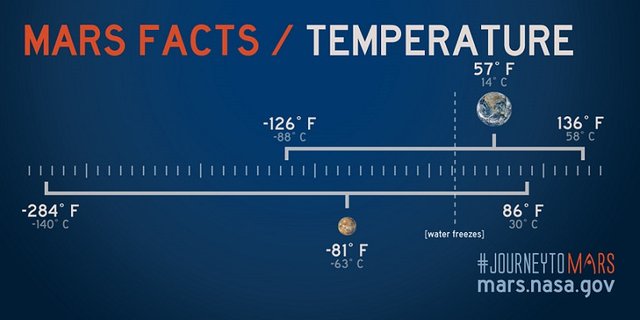
The thin atmosphere and greater distance of Mars from the Sun makes it much colder than Earth. However, because of its tilted axis and orbital eccentricity, it also experiences considerable variations in temperature. These can be seen in the form of a low temperature of -143 °C (-225.4 °F) during the winter at the poles, and a high of 35 °C (95 °F) during summer and midday at the equator.
Most humans will suffer hyperthermia after 10 minutes in extremely humid, 140-degree-Fahrenheit (60-degrees-Celsius) heat. According to a 1958 NASA report:
People can live indefinitely in environments that range between roughly 40 degrees F and 95 degrees F (4 and 35 degrees C), if the latter temperature occurs at no more than 50 percent relative humidity.
Pressure
We pass out when the pressure drops below 57% of Earth's atmospheric pressure.
According to wikipedia.org,
The atmospheric pressure on the Mars averages 600 pascals (0.087 psi; 6.0 mbar), about 0.6% of Earth's mean sea level pressure of 101.3 kilopascals (14.69 psi; 1.013 bar).
Which indicates that we cannot survive on Mars' atmospheric pressure.
Gravity
All human movement is gravity-dependent.
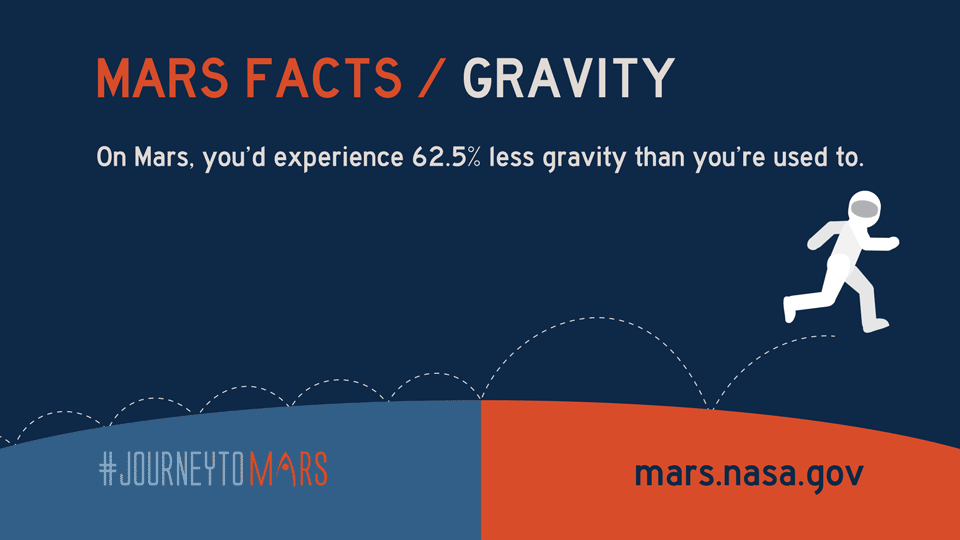
Gravity is the most valuable factor of life on Earth. Life as we know it, is impossible without gravity. Without it we couldn’t move the same way, we wouldn’t look the same way, we couldn’t breathe, and we wouldn’t have the air to begin with. The influence of gravity shapes and structures all living creatures including human anatomical and physiological structure, size and weight.
The gravity of Mars is weaker than Earth's. The average gravitational acceleration on Mars is 3.72076 ms−2 (about 38% of that of Earth) and varies laterally.
Without enough gravity, human health would quickly deteriorate.
Dr. Kevin Fong, author of Extreme Medicine, explained in Wired that:
"Less gravity would cause humans to quickly lose muscle mass, shrinking our legs and causing our hearts to become deconditioned and weak."
Interestingly, there is one benefit to this less gravity: It makes us taller.
According to LiveScience,
Astronauts grow about 2 inches in space due to the stretching of the spine.
Conclusion
Overall, Mars compared to Earth, is small, dry, cold, and dusty planet. It has less gravity, thin atmosphere and not enough breathable air.
All of these factors will have to be addressed and solved to allow humans to thrive and live on the Red Planet.
Image Sources: [1], [2], [3, 4, 5]
References:
http://solarviews.com/eng/mars.htm
http://nineplanets.org/mars.html
https://www.universetoday.com/34577/inner-and-outer-planets/
https://www.nasa.gov/press-release/nasa-confirms-evidence-that-liquid-water-flows-on-today-s-mars
http://sciencenetlinks.com/lessons/oxygen-machine/
https://www.everydayhealth.com/water-health/water-body-health.aspx
https://futurism.com/nasa-were-going-to-try-and-make-oxygen-from-the-atmosphere-on-mars/
http://www.newsweek.com/nasa-flowing-water-mars-just-sand-dust-717901
https://posemethod.com/gravity/
https://www.livescience.com/34128-limits-human-survival.html
https://en.wikipedia.org/wiki/Gravity_of_Mars
http://www.medicaldaily.com/life-mars-how-caustic-dust-atmospheric-pressure-and-low-gravity-may-alter-human-body-320170


Space exploration is quite interesting but expensive field of research. I just hope saving our Earth will be given more priority than finding another Earth. haha
Naay libre ticket padung Mars, mo-adto ka? Ahahaha!
Ellon Musk is responsible for this hahahah
If ever it would be possible, would you dare live on Mars?
I most certainly will, if given the chance to be one of the pioneers to live on Mars, then why not.
Naah I'm happy here.
Interesting post. Like it.
Very informative. It is a shame that we wont be here to witness...
naa koy balay diha
Payaman! #numbawan! Hahaha!
Probably will not be my next home, but I reckon in a generation or two perhaps. Although certain things from Mars do look irresistible. :-)

Thanks for the great post, I think you deserve a well earned treat.
Thanks :)